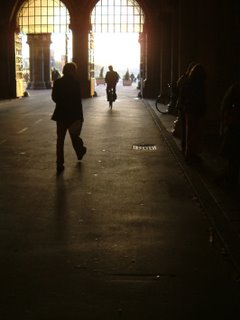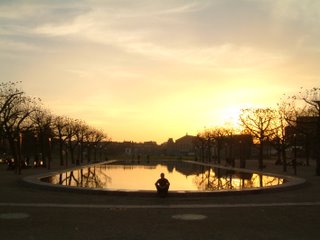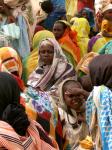
Right or wrong...? It doesn't seem right. Still, it's the system as it stands now, and I sure wouldn't want to be there. Here is a description of the maximum security prison where
Zacarias Moussaoui, the convicted 9/11 terrorist, was just sentenced. As the judge in the case said so eloquently, "you will die with a whimper." This place is messed up and though, the people in this prison are alledgedly the worst of the worst, this is no place for a human...dang. Plus, this place is only about two and half hours from where I live.
ADX Florence The United States Penitentiary Administrative Maximum Facility (ADX) in Florence is a supermax prison in Florence, Colorado. It is the only federal supermax prison in the United States. Also known unofficially as ADX Florence, Florence ADMAX, Supermax, or the Alcatraz of the Rockies, it is a supermax prison operated by the federal government. A part of the Florence Federal Correctional Complex (FCC) in Florence, Colorado, it houses only the most dangerous prisoners in need of the tightest control.
HistoryOpened in November of 1994, ADX Florence was constructed as a response to the October 22, 1983, prison guard killings in Marion, Illinois. United States Penitentiary (USP) Marion was, at the time, the holding place for the Federal Bureau of Prisons' most dangerous prisoners. However, in two separate incidents, an inmate managed to kill his accompanying guard. Relatively lax security procedures allowed the prisoner, while walking down a hall, to turn to the side and approach a particular cell. An accomplice would subsequently unlock his handcuffs with a stolen key and provide him with a knife.
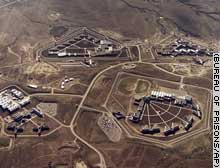
As a result, the prison in Marion went into "permanent lockdown," and entirely transformed itself into a "control unit" prison. This penal construction and operation theory calls for the keeping of inmates in solitary confinement between twenty-two and twenty-three hours each day. They do not allow congregate dining, exercising, or religious services. These practices are used as administrative measures to keep prisoners under control.
Following the killings, Norman Carlson, then director of the Federal Bureau of Prisons, successfully persuaded the federal government that a more secure type of prison needed to be designed. There was a need to isolate uncontrollable prisoners from both guards and each other for the sake of security and personal safety. Marion became a model for the subsequent construction of ADX Florence, a facility built specifically and entirely as a control unit prison.
The residents in the surrounding area, Fremont County, gladly welcomed the prison in a time of economic hardship. At the time, the county was already home to nine existing prisons. However, the lure of between 750 to 900 permanent jobs, in addition to another 1000 temporary jobs during the prison's construction, led residents in the area to raise $160,000 to purchase 600 acres for the new prison. Hundreds attended the groundbreaking, and ADX Florence opened in November of 1994 with a price tag of $60 million.

ADX Florence is now a 37 acre complex located at 5880 Highway 67, Florence, Colorado. It is part of four separate correctional facilities, representing four different security levels. More than half the jobs in surrounding Fremont County are related in some way to the corrections industry.
The PrisonADX Florence is generally home to between 400 and 500 male prisoners. About 22 percent of inmates have killed fellow prisoners in other correctional facilities; 35 percent have attempted to attack other prisoners or guards. As a result, most individuals are kept for at least 23 hours each day in solitary confinement. They are housed in a 7-by-12 foot (3.5-by-2 meter) soundproofed room, built behind a steel door and grate. The remaining free hour is spent exercising alone in a separate concrete chamber. Prisoners rarely see each other, and inmates' only human interaction is limited to that of the prison guards. Religious services are broadcasted in from a small chapel.
The cells are 60 feet below ground.
Most cells' furniture is made almost entirely out of poured concrete, including a desk, stool, and bed covered by a thin mattress. Each chamber contains a toilet that shuts off if plugged, a shower that runs on a timer to prevent flooding, and a sink missing a potentially dangerous tap. Rooms may also be fitted with polished steel mirrors bolted to the wall, an electric light, and a 13-inch black and white television, and a cigarette lighter. Windows in rooms are small, set high up in the wall, and point towards the sky, confusing the prisoner as to his specific location within the complex.
The prison as a whole contains countless motion detectors and cameras, 1,400 remote-controlled steel doors, and 12 foot high razor wire fences. Laser beams, pressure pads, and attack dogs guard the area between the prison walls and razor wire. Built into the side of a mountain, visitors and prisoners enter through a heavily-guarded tunnel.
ControversyPsychological EffectsMany have argued that the psychological effects of long-term solitary confinement can be devastating. Prisoners may suffer from hallucinations, anxiety, problems with impulse control, and self-mutilation. In addition, confinement may encourage anger and rage, resulting in further violence. Depression may set in, with prisoners becoming extremely lethargic, losing memory, and refusing to exercise.
Psychologists testifying in cases regarding solitary confinement have suggested that prisons could more reliably manage inmate behaviour were they to concentrate on fulfilling prisoner needs, rather than building oppressive controls.
Human RightsPrisoners have complained about excessive steps taken by guards and officials in these types of facilities to control inmates. Constant surveillance and random searches at the whim of prison staff can be humiliating, and their frequency may be used as methods of intimidation and sleep deprivation.
The maximum security facility at Marion, Illinois, which is the model ADX Florence is based on, has been denounced by Amnesty International, a human rights organization, for violating the United Nations' Standard Minimum Rules for the Treatment of Prisoners.
Some of the prisoners currently held at Colorado Supermax:
Matthew F. Hale (White Supremacist convicted of soliciting murder of a federal judge)
Theodore Kaczynski ("Unabomber" terrorist)
Terry Nichols (Oklahoma City Bombing conspirator)
Omar Abdel-Rahman (Islamist terrorist, nicknamed "The Blind Sheik", involved in World Trade Center bombing planning in 1993.
Larry Hoover (Leader of the Black Gangster Disciple Nation, based in Chicago)
Richard Reid ("Shoe bomber" terrorist)
Ramzi Yousef (Islamist terrorist, 1993 World Trade Center bombing)
Eric Robert Rudolph (Terrorist bomber)
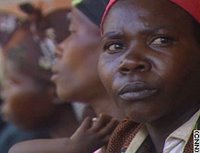 However, then I read about some of things happening in our world, and it makes me sick. Read this article I found on CNN about the horrible atrocities being committed in Congo at present. It's nearly unbelievable...talk about injustice and oppression. This is sick.
However, then I read about some of things happening in our world, and it makes me sick. Read this article I found on CNN about the horrible atrocities being committed in Congo at present. It's nearly unbelievable...talk about injustice and oppression. This is sick.

